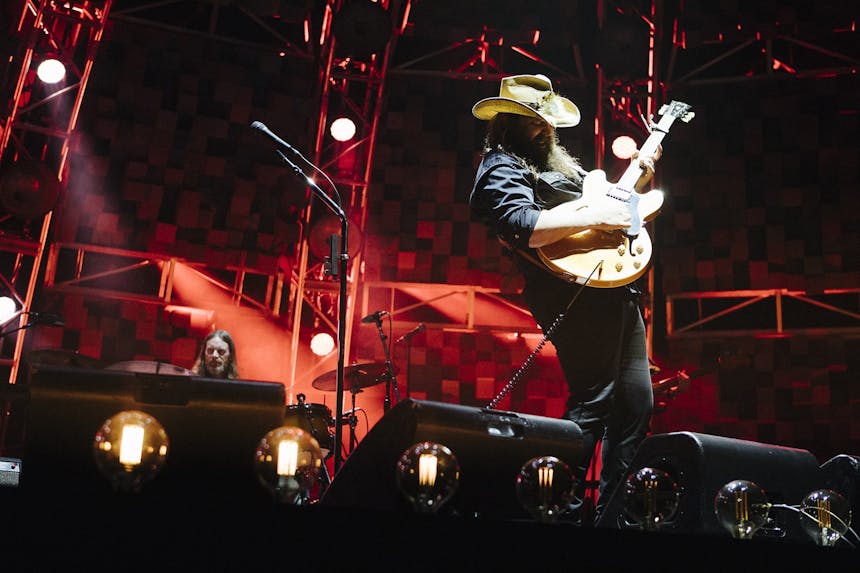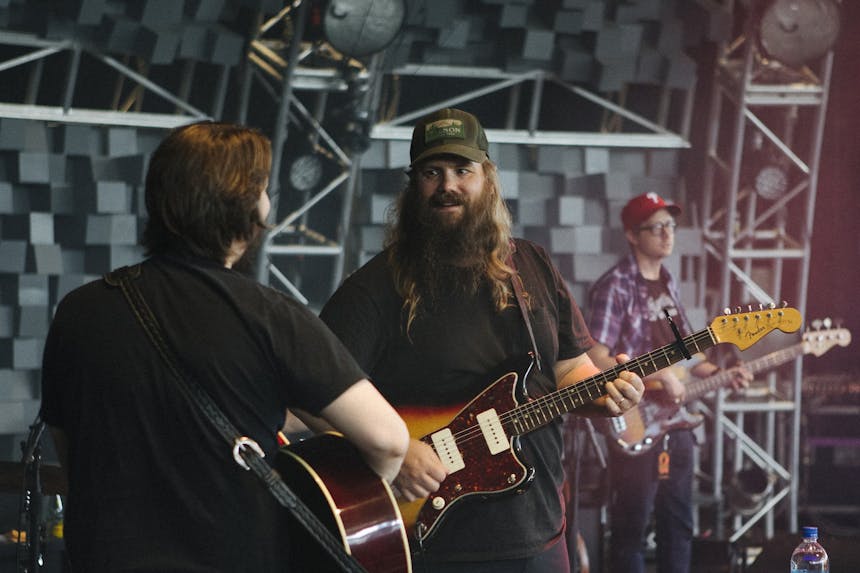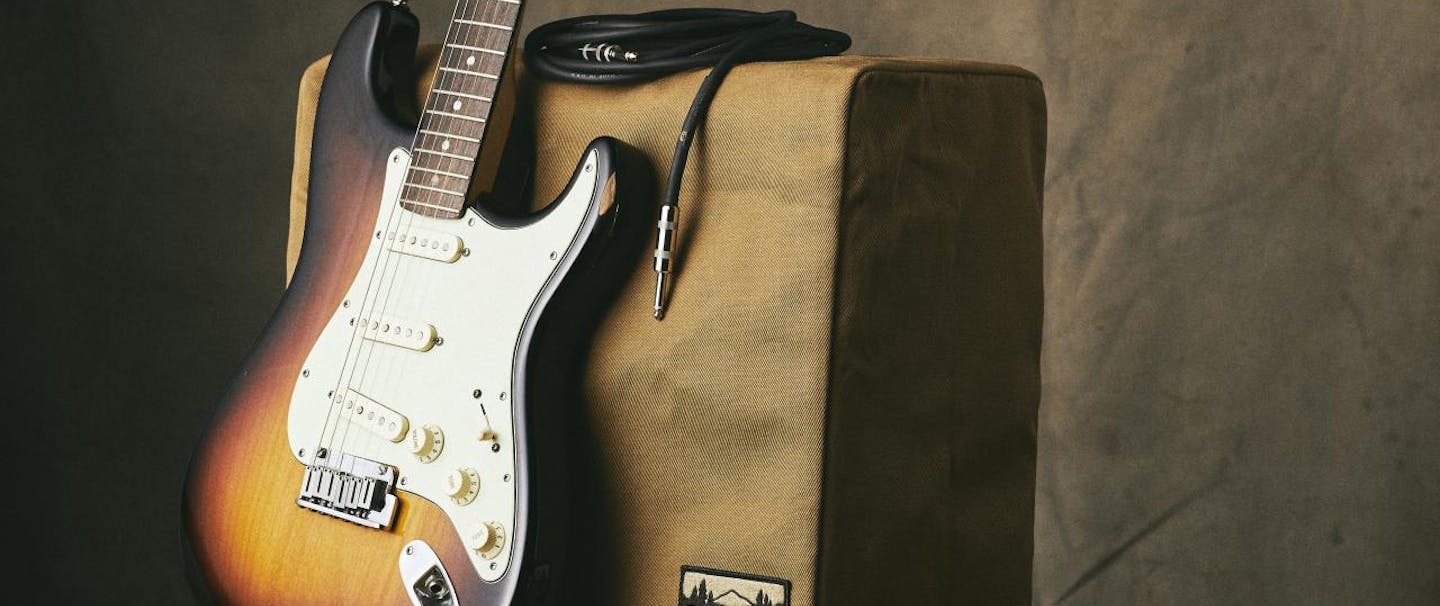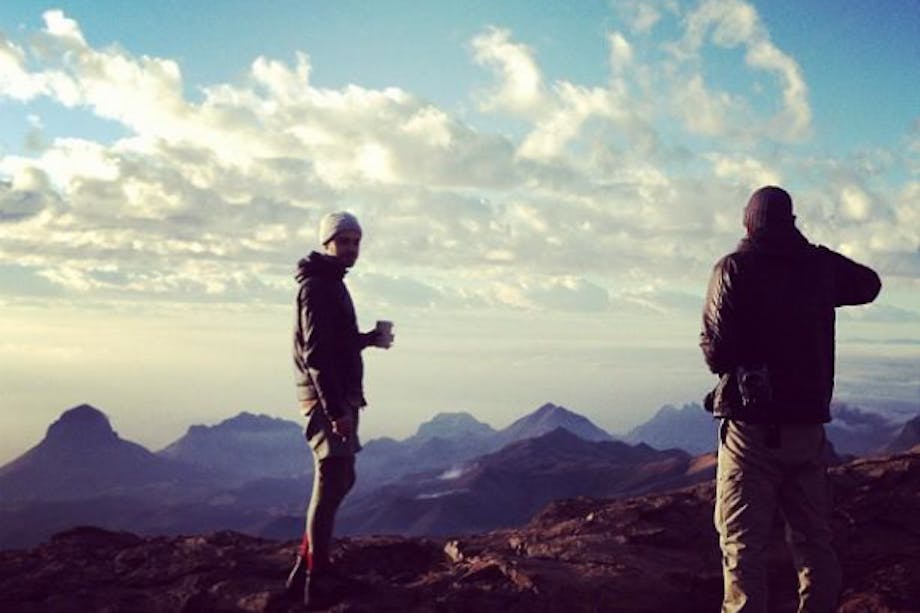Filson NYC’s marketing manager, Joey Holman, recounts the beginning of Filson’s relationship with country artist and songwriter, Chris Stapleton.
“Joey, it’s Clay. I’m gonna be in Seattle on Wednesday and was wondering what you’re up to after work. I’m working with an artist named Chris Stapleton and we’re doing a show at the Showbox.”
Hey dude! Never heard of Chris Stapleton. What time is the show?”
A text message exchange between me and my friend, Clay Hunt, who was tour managing Chris at the time, on November 9th, 2015.
Four years later, it’s funny to recall this conversation with Clay, as Chris Stapleton is now one of the most notable artists of our time. Still, regardless of the venue sizes we’ve seen him grow into, Chris and his team have always been loyal supporters of Filson and some of the most humble people we work with. He and his band were graciously a part of our Pioneers Book, photographed by Brian Bowen Smith last year, helping us raise money for the National Forest Foundation’s 50 Million Trees project. Most recently, Chris invited us to be a part of a collaboration he’s doing with Fender, tasking us to make the covers for his just-released, hand-wired 1962 Princeton Signature amp.
I had a chance to talk with Chris about our evolving relationship, the release of the new amp, and what legacy he hopes to leave.

Filson: Hey Chris, thanks for taking the time to chat. It’s been a while since we met in Seattle almost a week after your CMA performance in 2015.
Chris: That far back? (laughs)
Filson: Yeah – but you were a supporter of us before then – how did you get introduced to Filson?
Chris: I was introduced to Filson by my dad. He used your products to go hunt – he was a bird hunter and he kept English setters, trained them and hunt grouse, quail, and pheasant. Anytime he had some free time in different parts of the United States, he’d go hunting and he always had something Filson with him in the process.
Filson: I think a lot of our customers would be surprised we have so many musicians, film crews, photographers, and so forth use our gear on the road. You and your team use a lot of our stuff on tour. Clay has told me about how your bus bay is basically a Filson ad.
Chris: Oh absolutely. Every piece of luggage we use on the road – most of my guys, band and crew, we all have at least one piece of Filson hanging out with us virtually at all times.

Filson: Speaking of, I wanted to talk to you just a little bit about our experiences with you, your road crew, and your management – they’ve always been very easy to work with and everyone has always been extremely genuine – basically, far from what the stereotype of the music industry is. Was this intentional for you to build a team around you with these attributes or did it all just sort of fall into place?
Chris: Well, honestly, anybody I’ve ever met who’s had any degree of longevity in the music business has had all the qualities that you just mentioned. Sometimes we have a tendency to let bad behavior be the most visible thing in any business we’re in, and it’s easy to forget that a lot of the really good, professional people that have been around a long time conduct themselves with class and dignity. All the guys I’ve ever met, and ladies I’ve ever met that are heroes of mine and have been around a long time conduct themselves that way. I look for that in people to work with. I think that can help you sustain a career.

Filson: I remember when you guys came and did some photos with Brian for the book, I remember everyone texting me afterwards “Everyone is so great and so warm and friendly,” so we’re really thankful for that [part of you and your team]. And one of our favorite parts about our relationship with y’all is how you take our gear and make it your own. I’m thinking of a tour where you had your entire road crew in our Short Lined Cruisers with personalized chain stitching on the chest – it was a cool moment being backstage and seeing all the guitar techs, stage managers, and production people wearing our stuff. Whose idea was that to take Filson product and incorporate it into tour life?
Chris: I don’t want to give myself any credit, it may have been Clay’s idea to do some of the personalization of it – but it’s certainly something we always talk about doing. We try to find nice things for our crew, and functional things as well. And that’s the great thing about Filson, whether it’s a jacket or a bag, shirt, hat, any of those things. It’s always a beautifully made thing that will last.

Filson: Let’s talk about the Fender project. There are a ton of Filson employees who are musicians, so you can imagine how much of an honor it is to be a part of the project you’re doing with Fender. At what point did you say, “Let’s bring Filson into the mix?”
Chris: I think in the 50s and 60s, and I may have my information wrong, but there was a company called The Victoria Luggage Company that made covers for the amplifiers for Fender in that time period. [Originally] I had gone to Fender and wanted them to build me an amp, a new amp like the one I used, and then it kind of escalated into – ‘oh, let’s have a Signature amp!’ (laughs). So I said, You know keeping in tradition with Fender and partnering with a luggage company to build covers for amps, we should bring Filson into this. That just made sense to me because they’re both products that I love and it’s a tip of the hat to the way Fender would’ve partnered with somebody back in the 50s or 60s to make covers for amplifiers.

Filson: And a lot of people look at collaborations and think, “Yeah, they just partnered and made everything and now it’s for sale,” but they don’t realize the amount of time it takes to get everything locked in – from our first conversations with you and Fender until now, it’s been three years, basically. I know we on the Filson side had a couple rounds of getting the amp cover right – do you remember how many prototypes you had to test and what were you looking for from a sound perspective that made you say “This is the one?”
Chris: You know, I own several of the amps that this amp is modeled after, original examples, and I have one in particular that’s kind of my #1. I was looking for them to get as close to that as they possibly could, and they did that. I think now you’ll find the new amps they’re building, and because we were so mindful to build them with the history in mind, perform better and sound better than probably 90 or 95 percent of the old ones that you’re going to be able to find. And certainly the reliability goes way up when you get to have a new version of that, and so I couldn’t be more thrilled.
There was a moment when they finally brought what has wound up being our prototype, that’s the roadmap for all the ones they’re making. I sat it in sound check and just kept A-B’ing it with my #1, and you’d have to really be splitting hairs to tell them apart. I’m really pleased with where it got to, and that was always my goal. Much like most things, something worth doing is worth doing right, even if it takes three years of five years. Hopefully it’s a lasting tool. My hope for the amp is somebody will find something new to do with it that I don’t do with it. It’s a tool that can do that. So I hope it goes out in the world and finds new hands and provides inspiration for somebody.

Filson: In our Pioneers book we released a couple months ago, something that you, your band, and Clay were graciously a part of, we highlighted people who speak to the culture Filson believes in – hard work, authenticity, thoughtfulness… all of these traits come to mind when we think of you. From a legacy and pioneering standpoint, what would you like to be known for?
Chris: I would like to be known for being good to people. I want to be a good husband and father, first and foremost. Beyond that, in a musical sense, I’d want to be known for songs that will hold up over time and music that holds up over time. Music that can feel just as good to listen to 20, 30, 40 years from now. Only time will judge me on the front, but if I have a hope for music, that’s it.
You can buy Chris Stapleton’s new Signature Series 1962 Princeton amp here or see him play in a town near you on his “All American Roadshow” tour. Check out his tour dates here.


